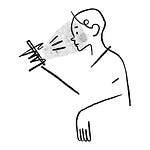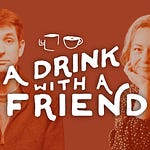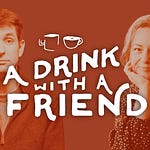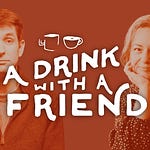It's always been easy in our culture to numb ourselves so we don't have to face honest truth, goodness, and beauty. ...The temptation's been even stronger in 2020. So what does it look like these days to posture ourselves toward healthy adoration — to devote ourselves to what is actually true, good, and beautiful, even when it's hard? Tsh talks with Seth Haines over drinks.
Seth’s website and newsletter
Tsh’s website and newsletter
It's not too late to order Shadow & Light
Seth's habit tracking spreadsheet (go to File > Make a Copy)
Atomic Habits, by James Clear
Browse Tsh’s recommended books
Pay what you want for Tsh’s audio workshop, Create Your Rule of Life
Visit StoryWorth.com/tsh for $10 off your first purchase
Tsh: This is The Good List. I'm Tsh Oxenreider and in this episode, I'm joined once again by my friend and fellow writer, Seth Haines, as we continue our multi-episode conversation about living sacramentally.
Seth, kick us off with a quick reminder again with what we mean by sacramental living.
Seth: Sacramental living is all about seeing the world around us as a manifestation of God's goodness His goodness exists in the creation we enjoy, the food we eat, the things we drink, which we are both drinking during this episode, and the rhythms of our lives, which is something that we've already explored and that you do really well. I'm super excited to keep talking about this.
Tsh: We're going to get into it a little more today, especially the rhythms bit. Because all of this embodies the life and idea of sacramentality, we’re calling the series A Drink with a Friend as a reminder. Seth, what exactly is it that you are drinking for this episode?
Seth: Today I am drinking a tea called The Gentleman and a Scholar by Savoy Tea Company, which is in my vicinity, it's in Fayetteville, Arkansas, and it's really, it's my favorite tea. As you know, I don't really drink a whiskey anymore for a variety of reasons, and this just, it has a hint, enough of a hint of that old whiskey flavor that it's really my go-to.
Tsh: Oh, I wouldn't have thought of a tea that has a whiskey hint. Why would it have that? Is it a particular type of tea? I mean, is it just plain black tea that just is, got stuff in it?
Seth: It's a black tea and there's a little bit of like an appley, oakey sort of hint to it. I think it's just whatever they put in it, which to be honest, I can't tell you. I should probably look that up. But it just has that sort of oakey, appley flavor to it. Caramely. I don't know. It's really nice.
Tsh: Very cool. I love it. That sounds good.
Seth: What are you drinking?
Tsh: I am drinking bourbon.
Seth: Yes!
Tsh: It's been a week for that. I'm just going to say the reason for it is because this week, Kyle and I celebrated 18 years of marriage.
Seth: Congratulations.
Tsh: Thank you. Thank you. We went out earlier this week. We live in this just insane neighborhood where a bourbon tasting restaurant just opened up on our street. Literally a three block walk from us is this new place so we decided to walk down there for our anniversary and it was delightful because this is the time of year where here in central Texas, the weather's really great. We sat outside on the deck and weren't too hot and not too cold and we had these drinks called, Kyle, said that on the menu, they were called Autumn Delight, I don't even remember what they were called, but all it really sounds. I mean, come on. It was actually really good though. Our waiter told us we needed to get them, so we said, okay, because we were in that kind of celebratory mood where we just say okay to the waiter.
Seth: That's a great mood to be in.
Tsh: It’s a good mood to be in. All it really is, is a bourbon with apple cider and cinnamon. Honestly, that's what it was. But I think the key is it has to be really good cider, like it can't be apple juice from the grocery store. It needs to be the good stuff that looks murky. That's what it is. I've got a couple hits of bourbon with a whole lot of apple cider, and then I couldn't find it, we don't have cinnamon sticks here. I found pumpkin pie spice though. I sprinkled some pumpkin pie spice in here, which has cinnamon and nutmeg in it basically.
Seth: So it's a fall drink.
Tsh: It’s a fall drink. That's what I'm drinking and recording this on a Friday afternoon, and I don't know, Friday afternoon for me means right after we're done talking, I start the weekend.
Seth: Yeah. And we kind of went with the same flavor profile today.
Tsh: Exactly.
Seth: That’s interesting.
Tsh: I know. There you go. All right. In this particular episode, we're going to talk about, I mean, it's kind of funny. We were just talking about this. I guess we could say the idea of addiction, but this word is really heavy and it also means stuff that maybe people don't think it means and it doesn't mean things people do think it means. Seth, this is a topic you have explored in great detail, especially in your first book Coming Clean. Would you start us off just talking about what addiction is and isn't, and why it's near and dear to your heart?
Seth: Well, it's near and dear to my heart because I’ve dabbled around in addiction so to speak in several addictions as it were. My addiction of choice for a variety of years was bourbon in the winter and gin in the summer. I actually drank so hard that I had different seasons. I would allocate the season after Easter and before my birthday, which is in October to gin. And then the season after October 25th until Easter was bourbon season. I drank really hard for a long time and then just kind of came to the place where I realized that it was really messing with my head messing with my life. It was directing me towards the end of the day in ways that I didn't really like it. So I hung it up.
But when I talk about addiction, I’m not really talking about alcohol or drugs or sex, like the big three. I'm really talking about anything that we use to sort of numb us to the pains of life, if that makes sense, the anxieties of life. We're in a really anxious season as we're recording this podcast. If there's one thing that I hear over and over again in this season, it’s the COVID is really terrible or the election is throwing me into a tailspin or race relations or throwing me into a tailspin and I find at the end of the night that I can't not, and then here comes the fill in the blank. For some people it's a drink for some people it’s binge-watch Netflix, for some people it's eat, eat, eat, eat, eat. For some people, it's binge shopping. It can be any number of things. When you talk to folks in these circles, like I do it all comes back to one thing, which is, I just want to escape the anxiety that's all around me in the world, the chaos that's around me in the world.
Tsh: When this episode goes out, it's going to be the start of the holidays. This is like in the thick, this is early December when people are feeling that pressure, I would say, to feel a certain way, or to make things a certain way. In your experience, is there like a correlation with the holidays and these forms of addiction?
Seth: For me, everything was a party. That's what got me in trouble. I was raised in Louisiana and Louisiana, everything is an excuse for a party. You have all these great feasts and all these great holidays and all these great celebrations. There's even a whole season where you have festivals, it's festival season, and so everything's a celebration. For me, I would, when I was in the thick of my own drinking problem, I was always looking for a reason to celebrate. I was turning everything into a celebration and particularly in the holidays, it's super easy to do that. There's always a reason to celebrate during the holidays. If you're not careful and you have already these baked in addictions, then when the anxiety of the holiday comes, yeah, man, just ramp it up, drink a little bit more. Or if you are addicted to shopping, which is a real thing, when the holiday comes and you have to find the perfect gift or gifts for everyone, you can just shop, shop, shop, shop and it's socially acceptable. I find that the holiday season actually is difficult because it provides you socially acceptable cover to do the things that are addictions either the big addictions or the smaller ones.
Tsh: I find too that, because these particular holidays, I mean, we're mostly talking about Christmas and Advent in particular right now, but because they are right before the flip of the calendar where people have this mindset of new year, new me, that perhaps there's even an excuse of I'm going to just not care for the next month and then I'm going to start caring January 1st. I can think of so many cases of that where it's possible, like the shopping, I'm going to deal with the credit card bill after the holidays. I just want this year to be great, especially in a year like 2020 when everything's been kind of hard. When it comes to the baked goods everywhere, for those who struggle with eating for the alcohol, I would imagine, and even the tendency to want to escape with good things because we want to make the holidays good when they're otherwise not good. Perhaps we're not getting to travel like we want and so we're just gonna do nothing but watch Netflix for two weeks or something. I don't know, to me, it just feels like a good excuse for a lot of that. I'm not putting anyone under the bus. I understand the tendency.
Seth: That is really, one of the temptations really is to say, well, I'll just muscle through this season and keep doing what I'm doing and then in January, I'll go ahead and turn over the new leaf, but we all know how long those new year's resolutions lasts, a week, maybe two. When you put off your addictions until the turn of the calendar, you might make good on it for a couple of weeks, but the more you train your brain to sort of give in to the addiction and give in to that sort of compulsion, it's probably a better word is compulsion. The more you train yourself to sort of give into those compulsions, the harder it's going to be to break out of them in the new year. Everything we do, every action we take, every drink we drink, everything we watch, everything we say, it just creates habit loops for us. Those habit loops are really hard to break. They form us.
Tsh: Hmm. That's really interesting. I'm working with a group of high schoolers this year at my school. We're doing a leadership class and the theme for this first semester is habit formation. And honestly the thing that keeps coming back is screen addiction for them. I know we're going to do a future episode where we're just going to talk about screens and social media in particular. But I see this really playing into the younger generation, but so many of us too, adults are just compulsive screen refreshers. It's not even because we want it. I don't know anybody who wants to constantly refresh Twitter, but it's like that habit loop is so instinctive, we have to constantly know what's going on. Yeah.
Seth: Yeah. And as we're recording this, I am constantly refreshing my screen right now. I'm checking vote counts every hour, as if the vote count is going to magically swing one way or another within an hour. I'm constantly refreshing Twitter to see who said what about what's going to happen in the political sphere. Maybe by the time we get to Advent, this'll all be a pleasant history. But I have noticed for me, just constantly tuning into the screen or constantly watching the news as if somehow the news is going to tell me something new than it did 30 minutes ago. It just sucks you in, you don't even realize it until you sort of step back and say, oh, I'm using this for something.
Tsh: If we talk about this in the context of sacramentality, that's the theme of this conversation series. If we talk about a sacrament being an outward sign of an inward grace, what to you is the correlation between living sacramentally and dealing with addiction?
Seth: I talk about this a little bit in The Book of Waking Up, the second book that I wrote, and if you look at the spiritual exercises of St Ignatius of Loyola, and you look at his foundation and his principle, he says that our primary duty, our chief aim is to love, serve, and reverence God. And to recognize that everything that has been created, everything that's created, the whiskey in your cup, the tea in my cup, the nature around us, has been created to draw us deeper into loving and serving and reverencing God. Which can be as simple as, oh, man, this tea is so great. Thank you for the tea and the talent that blended it. So awesome. Just drawing us back into the thankfulness and the gratefulness of being alive, being in the place, experiencing the grace of God in the land of the living.
Then he goes a step further and he says anything that doesn't lead you to better love, serve, and reverence God, get rid of it, cut it off. This is the principle and foundation for his spiritual formation work, that now spiritual directors, mine included use. For me, addiction really is about, let’s notice the things that were not created bad. They weren't created as negative things, but we're somehow misusing them. We're attaching to them instead of to God, we're not letting those things draw us through to love, serve, and reverence God. Then let's get rid of them, if we can, let's order them under the proper foundation of loving and serving and reverencing God. But if we can't, let's get rid of them. That's why people with a sacramental view who struggle with alcohol say, you know what, alcohol doesn't help me love, serve, and reverence God, so I'm done with it or I'm done with it for a season.
Tsh: That's interesting. What I think of what my brain goes to is yesterday in my high school English class, we're going through Inferno and we're going through the circles of hell and the kids are talking about why are they in the order that they're in? And it was really interesting to me how Dante ordered the first, I think it's like four circles of hell, aside from limbo as it’s lust, gluttony, greed and anger, I believe. And the kids were like, why in that order? Ultimately what it comes to is he placed these, as the circles get wide and they go narrower, that implies that the wide circles are the ones that are hugely common, that so many people deal with because there's so many people in these circles that all they can be boiled down to is misplaced adoration of a good thing. These are gifts from God. If you consider lust and love, greed is hoarding good things, all these things. I won't get into it, but to me, that's what this echoes completely.
Seth: I love the fact that you use the phrase misplaced adoration. I mean, that's what it felt like for me. I mean, even in journey farther along into the sacramental life when I stopped drinking and I guess this is about four years ago, I started going on the road a lot for business. I started thinking, I hadn't had a drink for three years at the time. I started thinking, I'm all alone, I could do whatever I want to do. Nobody's ever gonna know, I'm on the road for four or five days at a stretch. I started thinking, man, I need something to sort of anchor me. I was in Murphysboro, Tennessee, oddly, and I looked up this local church, and they had this adoration chapel where you could just go and sit in adoration and you could be with others who were around you in praying and really participating in focusing their attention on Christ. In that moment for the first time, I really went, and I was just sitting there thinking, this is the thing that can hold my attention. This is the thing that can get me through this week is just really focusing on the front hand, my attention on proper adoration versus misplaced adoration. I started incorporating that into all my road trips. I love the idea of adoration as a hedge against addiction.
Tsh: That's really cool. I want to get into that a little bit more when we start getting into rhythms as a good replacement for addiction. Something I've been thinking about is if the definition of a sacrament officially as an outward sign of an inward grace, then maybe the converse, addiction could almost be anything that seems like an inward sign of an outward stronghold. Like this idea that if I'm addicted to something outwardly, it must be holding onto me in some way. I think of that related to mine and Kyle's history, neither of us have dealt with an addiction to things like food or alcohol the classic addictions. But whenever we returned from living overseas in Turkey, this was 10 years ago now, we went through this, for lack of a better word, a debriefing process, where we went away for a week and we worked with counselors who were trained in helping ex-pats repatriate to their home culture. We took test this, it was almost like a test you would take from a psychologist to see how crazy you were. It wasn't a test to see sanity or to test sanity, but it was to test your stress levels. I don't remember what our hard numbers were, but especially Kyle's were off the charts chronic stress. We looked at that and we thought, well, that's kinda weird. I mean, yeah, of course living in a different culture is stressful, but long story short, what the counselors ended up talking with us about is that we were so stressed we didn't know we were stressed because we had been living with it for so long and it became our new normal. We didn't notice it anymore. Looking back, I can see, it was almost like we were addicted to stress, but not because we liked it. It was because it was all we knew. I just wonder how many of us are addicted to things we don't even like, but it's just all we know and so we don't even notice we're addicted. Do you find that to be true?
Seth: Oh yes, absolutely. I find that to be true. In fact, I was talking with a friend this week who was saying that this whole situation of 2020 that we've been living through, that he was quote made for this. And as we started talking about it more and more, what he really was trying to say was I'm addicted to chaos. I've always been addicted to chaos. 2020 is chaotic. This just feels like home for me. He's had some of his own struggles this year, as we all have. He doesn't necessarily like the struggle aspect of it, but for him, he's just saying, this isn't good for my soul. It's not good for the way I feel. It's not good for my spiritual life and yet somehow I feel at home in all of this chaos. Yeah, I think addiction to chaos is absolutely a thing. I think it sort of drives a lot of workaholism, too. This addiction to stress and chaos, oh well, there's one place where I know I can always find stress and chaos and it's at my office, so let's go there. I think just a lot of the sneaky sort of addictions that come up on us, really can be brought back to things like stress and chaos.
Tsh: It almost feels like our culture's default is an addiction to anything novel. And it's almost because we have wiped out the need for boredom. We don't have any place for it in our lives anymore because we can literally carry in our pockets, a computer that is more powerful than what got NASA to the moon in the sixties. It's in our pockets when we're waiting in a grocery line. We cannot abide by boredom. And so we become addicted if not to screens, just to, like you said, news or chaos or watching train wrecks or any sort thing that just feels out of the ordinary. It's like we can't get enough of all the while hating ourselves for it. You know? Because I don't know anybody who loves this kind of stuff on paper, but we act like we do if we're looking at our actions.
Seth: Yeah. And no matter how much we want to break away from it. I think screens is a great example. Like you can always find excuses to stay connected, to stay plugged in, to stay addicted and for us, for what we do when, as we right as we market for other things, you're almost told that the screen is a necessity. That Twitter or Facebook or YouTube or whatever, podcasting or whatever is a necessity. But at the end of the day, I think a lot of times we do this stuff just because it’s what society tells us we're supposed to do and we dig in and we do it hoping that somehow this will scratch a certain niche and these things start to use us more than we use them. That's real dangerous.
Tsh: Yeah. It’s like we just want to escape ordinary because if we live in the ordinary and I guess by proxy boredom, we're going to have to deal with stuff. We're going to have to deal with our inner selves and hear those voices that we kind of don't like, the things that probably when you're going through detox of some sort, you're going to hear these voices that are screaming at you and we don't deal with that very well. We don't like pain in our world anymore.
Seth: It's the worst. There's this addiction writer, his name is Gabor Mote and he's an amazing writer. He he's written a book called In the Realm of Hungry Ghosts about heroin addicts that he’s sort of been through treatment with. And one of the things that he says is that the question for the addict is never why the addiction, but it's why the pain. He says all of the things that we do, all of the addictions that we have are really just ways to cover up and numb ourselves to the pain. His addiction, which was super interesting, was an addiction to classical music.
Tsh: That is weird.
Seth: He would find himself at the end of a super stressful day, going to this used record store that he had nearby, near his office. And he would just peruse the classical shelf until he found the perfect album that he didn't have. He would run up hundreds of dollars, sometimes a day buying these classical records and it got so bad that he hid it from his wife. He hid it from his friends. He would stash records in his office so that he wasn't bringing too many home. He just woke up one day and said, the record for me looks a whole lot like heroin for my clients. That's when he started to unpack these myriad ways that we're all addicted to something.
Tsh: That is fascinating. I would have never thought of that being a temptation for somebody.
Seth: Yeah. But think about it, like all of these things, and this is why I think it blends so well with sacramental thinking, all of these addictions do something for our brains, right? When I drink and I release the stress, the body releases dopamine in my head and it says, oh, you got rid of the stress, that drink felt good. We need to do that some more. Or when you're lonely and you want to connect and you go to Twitter and you connect with people virtually, a thousand times faster than you could have in any other stage of history, the body, the brain releases dopamine and says, oh, that felt good. Let's do that some more. Let's do that again. Next time you're lonely, do that again. And so for Dr. Mate, it was, you're a hunter by nature and he was going out on the hunt and when he was stressed and when he didn't have enough and when he didn't feel good enough about himself, he would go out on a hunt and then he would find the perfect thing and he would slide the card and leaving the record store, his brain would release the dopamine to say, you went on the hunt, you conquered, you found this feels good. Let's do it again. And you just get in these dopamine loops.
[AD BREAK]
Tsh: For those of us that have not thought about it to the level you have, what's the solution then? Because I can imagine the vast majority of listeners right now are thinking, okay, but I'm not addicted to classical music. I'm not even addicted to alcohol. I might even say, I'm not super addicted to phones or whatever it is, but they might be addicted to something else that just feels almost like you can't just throw it away. We're not necessarily saying don't pay attention to things, right? Whenever we talk about Twitter disparagingly, because we are here for it when it's put in its right place in our lives. What's the solution then besides just throwing it all away?
Seth: Fascinatingly, some of the folks out in Silicon Valley have started these things called dopamine fast. Have you heard of this? They'll pick like a week or five days or something and they'll essentially sit in an austere room with nothing but a computer that's really not connected to the internet, so they can only do their work for the given time period. They have no caffeine. They eat no food. They do no social media. They have no sex. They do nothing that feels good. The premise, the idea there is that it sort of regulates the body so that you can then begin to notice what are the things I miss the most? What are the things that I really feel a draw to? For some that may be, oh my gosh, I just realized I can't live without social media. For others, it’ll be like, well, every day at three o'clock, I want a candy bar. These dopamine fasts show them the places where they're overstimulated and allow them to regulate. I think that's a little too much.
Tsh: Well, and it's also not possible for many of us with kids and jobs.
Seth: It's totally not possible. But what you can do is you can sit down, I tell people all the time, sit down for 30 minutes, first of all, if you can't find 30 minutes, then you're addicted to busy-ness. There's a thing. Find 30 minutes, sit down in the silence and just start making a list and even rank it. Here are the things that I don't think I could live without, or here are the things that constantly pull at my attention. If the thing that constantly pulls at your attention is Twitter or Amazon or booze. For me, it was gin in the summer and whiskey in the winter. If that's constantly pulling at your attention, if you're thinking about drinking at one, good chance that you need to start evaluating your relationship with alcohol, if you're thinking about shopping at one in the afternoon while you're at work and you start cruising, that's probably a good sign. If you can't get food out of your mind, if you can't get sex off the mind, whatever it is that just constantly vies for your attention and distracts you from the things that are important, those are the things that you write down on this list. Then you say, okay, how can I carve out space to either get rid of it per the ignition exercises? Or order it in a way that it's only being used to bring me further into relationship with God.
Tsh: Hmm. I guess when it comes to that, to me, it sounds like that's for someone who perhaps is on the beginning stages of realizing, whoa, this has a stronghold, it's not a full-on someone who needs, to maybe go to a form of rehab for Amazon or whatever. It’s somebody who's willing to notice and put a guard rail up. In your experience, Seth, as someone who deals with addiction and someone who's just hyper aware of it, like we all should be, what do you do? Give me a boots on the ground, practical stuff you do in your life to make sure things stay on the rightful place.
Seth: First of all, so for me, obviously alcohol is the one that constantly vies for my attention. I even write about this and I say, the goal is not to never have another drink again for me. I know that some people, it has to be, that that for me is a non-starter because then I start thinking, oh gosh, I can never drink again and then the loop start and all I want to do is go drink. For me, I have to have different ways of thinking about it. One of the things that I try to do is just surround myself with people that know my struggle, be clear about the things that I struggle with and tell them to, hey, the goal here for me isn't to never drink again. But if I'm asking you for a beer, I want you to ask me if I'm okay, because I'm probably not. Just building networks of support around you outing whatever the thing is that vies for your attention and then asking that community of people to hold you accountable. That's like the primary rhythm piece for me. If I disappear on that group on that core group of people, they're going to come find me and say like, hey, are you okay? I think community is a huge one.
The other is just the spiritual discipline of carving out time for solitude and silence and being alone and constantly examining what's going on inside. If I feel drawn to something, what's going on inside, that's making me feel drawn to that, or why can't I settle down long enough to sort of recalibrate. Solitude and silence is a huge one for me.
Then I think the third one is just continually participating to the extent that I can in the rhythms of the spiritual life, through my local faith community so that I'm trying to be involved in the rhythm of service again, to the extent I can in COVID or be involved in the rhythm of worship to the extent that I can during COVID. To just put myself in a position where I'm constantly reminded of the sacramental reality so that I don't fall temptation to my own, fall to the temptations of my own desires.
Tsh: To me, examining these, number one and number three, feel like they have to do with community. Number two has to do with being okay with being by yourself. All of those of which are hard, because some of the things that we, our tendency to be addicted to you are ways to cope with almost having a false sense of that. Like social media gives us a false sense of community, drinking probably gives us a false sense of inner peace or something like that. To me, it sounds like you're almost saying lean into the hard, awkward messiness of all of those things.
Seth: Yeah. A hundred percent. I think that's the way of being human. We were created human to be with other people. We were created human to understand, and to know ourselves, we were created human to know God by knowing ourselves and by knowing our community and really all of those, when you're with other people in community and you're celebrating good things, things like food and wine and tea, like our conversation, it's really exciting. It's good stuff. It's stuff that makes you happy that that brings you joy. That brings connection, right? That's really good stuff. Being in solitude with yourself and understanding yourself better, like when you have those personal breakthroughs about yourself and who you are, that feels really good. Even if it's, I struggle with this thing and I need to go get help. I mean, this is why people love therapy so much. You leave therapy and you feel like you yourself better. And as a result of that, you feel like you can do more, you can overcome more. I do think that those things are really important because it's really what it means to be human.
Tsh: Right. For me, I’m still learning about this, about myself. You were the one, you're the friend of my life who is helping me frame these things that we deal with as addiction and not just advice or not just a problem that we all deal with, but a legit addiction, I'm still working through this. But, for me, probably the main key that's been helpful is this idea of having intentional rhythms and routines in my daily life and not because I'm a disciplined person actually, because I know I'm not by default if I don't have these things in my life. And so practicing things that I just wake up and have to do almost, you know that idea of we all make 35,000 decisions a day or something like that, whatever that concept is…
Seth: Too many.
Tsh: Too many decisions a day. If we can eliminate having to make those decisions at least a lot of those decisions, then we have more energy and ability to conquer those decision-making times that are more challenging. For me, that looks like really strong bookends, specifically in a day, I mean, morning and evening. Having a very set habitual morning routine and a habitual evening routine to start and end my days, not saying it's like the panacea to make everything okay. But there's something about the idea of having those things being really sturdy and without needing to make any choices that almost makes me feel a little bit like, okay, the middle of the day, I can at least, have a little bit more energy and brain space to deal with. Now it looks like doing the same for me, the same five things every morning, just because, not because they're sacred and not because they can't ever be budged, but because that just works for me. For everybody, it might be different. But for me, that looks like coffee, that looks like writing down my to-do list, that looks Lectio Divina, that looks like 10 minutes of yoga and it looks like walking the dog. It's just these five things that are so boring, really and truly, they're not that, I say boring in that I didn't invent them. Then the same kind of idea in the evening. There's something about that just grounds me to making me feel like I'm a person. I mean, this is the classic idea of sacramental living, right? The idea of all these little parts of my life are infused with the goodness of God when I choose to let things like brewing the coffee be infused with the goodness of God. And it gives me, I don't know, just a little bit more of a chance to not deal with the things that are hard in the middle of the day.
Seth: I think you're the one that actually told me about James Clear's book, Atomic Habits. That book was so helpful to me and it sort of changed a lot of the way that I approach my life, too. I wouldn't say I'm an undisciplined person at all, but I wouldn't say that I am a rhythmic, necessarily a rhythmic person either. That's sort of the things that I've always kind of appreciated about you is that you've always been so good at expressing how important the rhythms are to you and casting a vision for those rhythms. I think that those rhythms really do keep us from falling into these accidental addictions. If you have somewhere you're supposed to be and something you're supposed to be doing that removes, like you said, that choice for addiction. I think that's what you're saying?
Tsh: Yeah. That's what I'm saying. That's what it looks like on a macro level when we're talking daily, but if you zoom out, it's even with the liturgical calendar is about, in some ways. Not saying that by following the liturgical calendar, you will not be tempted to do something but there is something I think God given in us to lean into rhythms. We are a people that, we have circadian rhythms, we have seasonal rhythms collectively when it comes to the harvest seasons. We like rhythms. Rhythms are good for us just because that's how God made us. To me, it feels like we're just being more of who we're made to be when we invite rhythms into our lives that work well for us and keep them healthy, not veering into legalism, but just providing that scaffolding we need to mark our time like we talked about last time with Advent.
Then the other thing I think is helpful is, and I talk a little bit about this in At Home in the World, the book I wrote about travel that there's a Benedictine vow, there's three main vows that most monastic traditions take, but the Benedictines take one more vow, and it's the vow of staying put. It's the vow of stability, actually. The vow of stability talks about basically staying put, even when things are hard and more importantly in our era when things are boring. Kyle and I made this unofficial vow really when we moved to the small town that we're going to take the vow of stability, that we can be addicted to novelty and want to just escape to the next thing. We can do that by way of travel, but really we can do that by way of all sorts of things and staying put is that idea of leaning into the boredom and leaning into the heart and not trying to chase it away with some form of one of our drug of choices. I think the Benedictines have have a, they're smart to make a whole vow about that because I don't think it's a human tendency to want that, you know?
Seth: Yeah. You were the first person that I ever heard say the vow of staying put, and it's always stuck with me. I think that really is the goal. If you can stay put in your community, stay put within yourself, even, don't veer off too much into your own internal chaos and stay put with your immediate friend circles. There's something about that vow of stability that really like, if you could just run your whole life through that vow of stability, I think it would change probably a lot of what we do.
Tsh: I think we need to have a whole episode about just the vow of staying put, because that's so hard for us in our world. Even if geographically, we don't move, we don't stay put very well.
Seth: You'll have to let me know when we do that and I'll interview you that all episode because I'm not super good at staying put as you know.
Tsh: Well, I'm not either. Kyle and I have to remind us of this geographically anyway, in July, August when we are here and we questioned our sanity why we left Oregon. That speaks into why taking a vow is important. It's not because you're great at it. It's because you absolutely need it. We're not any good at it, really.
Seth: The question that I have for you is what circle of hell did you move into in July and August? Speaking of Dante because wow, it gets hot down there.
Tsh: Yeah. It really does. Right now, I mean, apropos of nothing, I'm having the kids, my students, draw Dante’s circles of hell in 2020. I figured, why not for the holidays, let's decorate the classroom with Christmas lights and images of hell. They've turned it into a shopping mall. They've created these levels of a shopping mall. Limbo is a parking lot with no spots and everyone's just wandering around aimlessly. It's so smart, but anyway, I think of that a lot, what does Inferno look like in this day and age? We've all agreed that it's gotta be the eighth or ninth circle of hell, Texas and August..
Seth: Yeah. I think that sounds right to me.
Tsh: It's now time in our chat to talk about one thing or habit or idea or work of art that is currently making our lives a little bit better because we're all about the little things here. We've also paired our drinking somewhat with our choices. Seth, why don't you tell us first off, what is currently making your life a little bit better?
Seth: I created in October this values checklist. I have a few values that I try to order my life by. So it's faith, family, health, creativity, and work. Also I have another category that's thinking, thinking in an election, like how much time am I spending, allowing myself to have some thinking time because I need that for my last…
Tsh: That is a classic five category.
Seth: I’m sorry. I come by it honest, but I have all of these different charts and then I have different things within the charts and I just mark, some of these things I want to do daily, some of these things I try to do a weekly and some of them are really just monthly, but I just want to make sure that that I'm taking care of it. That chart is making my life a little bit better. It makes me a little more sane. It makes me a little less tempted to go get slobber knocked on the bourbons, which is why it pairs well with The Gentleman and the Scholar tea.
Tsh: And it pairs well with this conversation.
Seth: I hope so. These are the things to me, again, not being a very good arrhythmic person, I just want to make sure that I've got something to hold me accountable to those rhythms. Now that said, I haven't created the November charts yet. I just have kept going at the end of October. I'm actually a little bit behind on November.
Tsh: Okay. When you get them all up to speed, maybe you could share the template for those of us who were curious, because you made this on Google sheets, right?
Seth: Yeah, I did. And I would love to share the template. I'll share my template, but then everybody, because you have different values, you would just put whatever your particular value is at the top and then have the little sub categories that you want to check and track along the way.
Tsh: Yeah, really cool. I’ll put it in the show notes for people.
Seth: What is a piece of art or a habit or something that's making your life a little bit better?
Tsh: Right now, and even now, literally not just when this episode goes out, but now for me, the Advent playlist I created to pair with my book, Shadow and Light, is on repeat in our house already. Part of it is because boy, if we need an extended holiday season of all years, I think 2020 is it. To me, I have no shame playing music, but also because I really like this particular playlist, if I say so myself, because it's not Christmas carols, this is particularly Advent music. It's Advent specific because as we know, Advent is about waiting in anticipation and expectation. I purposely picked songs that aren't about, yay, Jesus is born. They're about what it looks like to sit in the discomfort of things. I thought this is probably a good work of art that pairs with addiction, because a lot of addiction is about not being comfortable with waiting or not being comfortable in the messy middle of life. And that is also Advent in a way, right? Advent is about, wondering if what God has promised will come to fruition, those 2000 years ago, but even now when we wait for the world to be made right. A lot of the music here has been really good for me for 2020 because it's easy to look around and wonder what the heck is going on. There's a lot of artists I love on here. There's a lot of old music I love on here, which I think is really great because it tells me nothing new is under the sun. People have been wondering this kind of stuff for a long time. In particular artists on here that I’m really grateful for, a band called Ordinary Time, All Sons and Daughters and the Brilliance, and also Andrew Peterson. He shows up a couple of times in this, but it's a really good playlist for those of us who just feel that, I just want to sit with art that understands what it feels like to be uncomfortable.
Seth: Is there a track on there that's kind of unexpected?
Tsh: I'm looking at it right now. There's a of tracks that people would say, that's not Advent. I'm looking, I've got Leslie Odom, Jr. In terms of a particular song, I'm going to say Kyrie is when by Cardiphonia that maybe doesn't feel, kind of a theme that I recirculate in Shadow and Light is this idea of why is a world all messed up? And I want to lean into that instead of let's just pretend it all away because it's the holidays. To me, “Kyrie,” that call out to God, like have mercy. That song has been on repeat a lot. “Let All Mortal Flesh Keep Silence” is on there.
Seth: What a song.
Tsh: Yeah. That's when I got on repeat a lot because I mean, self-explanatory in a way. I'll put it in the show notes if anyone's curious. These songs have really been good for me. “Heaven Meets Earth,” a lot of good stuff.
Seth: But there's no Beyonce on it. Or Jay Z.
Tsh: No Beyonce. We've got Leslie Odom, Jr. But the rest of them are little known musicians, which I tend to like.
Seth: Of course you do.
Tsh: Of course I do. I’m a little expected in that way.
[LISTENER VOICEMAIL]
Hi, Tsh. This is Carol White from Richmond, Virginia. One of the practices that has made my good list in 2020 is what I call monthly musing. One the first three days of each month during my early morning ritual, I create a page for that upcoming month that includes context and experiences that I'm anticipating. I use a spiral bound notebook with grid paper, since I have a particular acidity for lettering and drawing on grid paper, but a blank sketchpad would work just as well. In the center of the page, I start by lettering the month's name and then ever there's three mornings I note a smattering of realities and or perspectives that I am anticipating this new month will hold. It's somewhat of a mind map that is my way of inaugurating the new month and mindfully welcoming what the days may hold. Side note, I keep a variety of markers and pens within reach to add simple drawings and designs since it's always more fun to live life in color. Looking back through my monthly pages, here are some snippets I lettered for the month of April, 2020, which gives a nod to my role as both an ER nurse and an instructor for student nurses. Sheltering at home, creative connections, buds and blooms, purposeful podcast listening, #loyaltolocal, final weeks of this semester gone virtual, COVID 19 clouds, all the PPE, amped up self care, et cetera. I think you get the idea. Not only is this practice a creative outlet, but on a deeper level, it has honestly become an anchor of hopeful expectancy for me towards the month that could be met with dread and anxiety with all this occurring in our world today. Thank you, Tsh for how intentionally you flush out your passion. Your podcasting and writing make an impact on me and countless others. So carry on with your whole heart.
Tsh: Well, thank you so much to Carol for sharing with us what's on your good list and I would love to hear from you as well. Call and leave us a short voicemail at (401) 684-GOOD telling us a habit, idea, thing, or work of art that's making your life better these days.
You can find all my work at tshoxenreider.com or you'll find links to things like my audio series about Creating a Rule of Life. My weekly newsletter called Five Quick Things and my books, including my new book on Advent called Shadow and Light. It's not too late to get it even though Advent has already started. You can join in whenever you need to. If you go to shadowandlightadvent.com or just my tshoxenreider.com website, you'll see the book there, a link to join a community and all the extras like the music I was just talking about
Seth, where can we all find you?
Seth: You can find my books wherever fine books are sold, including those places online. You can find my writing and Sethhaines.com and anywhere that a hashtag is involved. I am @SethHaines, H A I N E S.
Tsh: All right. Music for the show is by Kevin McCloud and thanks as always to Caroline TeSelle and Kyle Oxenreider for their help, as well as my furry, Ginny. I'm Tsh Oxenreider and Seth and I will be back here with you again. Thanks for listening to The Good List and Seth, thanks again for joining me.
Seth: Thanks for having me. It was a blast as usual.












Stuff of Earth (with Seth Haines)